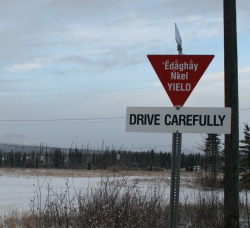
KEY CONCEPTS: adaptation, motivation, life-long learning, necessity is the mother of invention
This small business employs 10+ people during peak season and provides services ranging from hotel, food, to adventure tourism to guests from travelling along the Alaska Highway as well as destination travellers from overseas.
The employers indicated that the nature of their work required that staff worked independently and were able to be self sufficient over extended periods of time, serving customers but also when they are between shifts in staff housing.

Asthma was identified as one type of disability that they have accommodated in the past. Both employers have themselves experienced challenges arising from partial paralysis in recent years, forcing them to both on separate occasions rethink how they themselves conducted their work. This adaptation included learning to write with the opposing hand, and altering the way overhead tasks were completed.
Disability was discussed by the employer in terms of the relationship between the person with disability and the environment in which s/he worked/lived. The suggestion was that a disability was only present when a person encountered a barrier that limited their ability to complete the work as required. This is the social constructivist view of disability. In short, this employers suggested that a person is disabled only if they are unable to do a certain job.
Back to the example of his own personal experience, this employer had to retrain himself to write and do various tasks given paralysis down his right side, given there are tasks he has had to do differently given his condition – but as long as he is ultimately able to do the task, then he does not consider it a disability.
These employers were open to hiring people with disabilities given the prospective employee both wanted and was able to do the job. This sounds like a given, but the employer went on to discuss the importance of finding work that is enjoyable, given additional impediments encountered over the course of employment arising from a potential disability would only make things difficult for both the employee and employer if there wasn’t an underlying desire to work.

Key to overcoming the barriers that disabilities present is a drive and determination to succeed, rooted in self-determination and aspirations to achieve life goals. This employer cited the old adage that necessity is the mother of invention - similarly, necessity is the key to overcoming barriers in work and life given a disability.
When asked about what they believe an effective Yukon Disability Employment Strategy might include, these employers indicated that that government should not be overly interfering with business, but should offer supports employers through resources, information and potential funding to accommodate people with disabilities. This employer finished with a warning; warning the government to not make things too easy for employers or employees – ostensibly removing the essential business and community ingredient for innovation and social responsibility, namely, necessity.

No comments:
Post a Comment